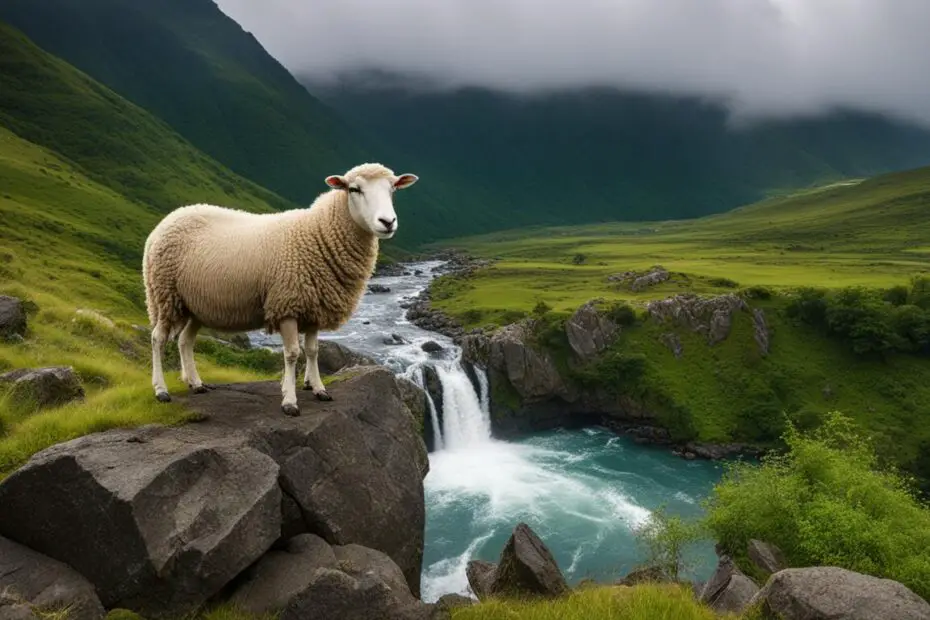Sheep are known for their resilience and ability to adapt to various environments, but can they survive without humans? In this article, we will explore the natural adaptations and instincts of sheep, their dependence on human care, and the challenges they face in the absence of human intervention.
Key Takeaways:
- Sheep are well-adapted to survive in extreme climates and upland habitats.
- Wild sheep can thrive without direct human intervention, relying on their natural adaptations.
- Domesticated sheep have become dependent on humans for their care and survival.
- Sheep are social and emotional animals, relying on the presence and interactions with others.
- Sheep possess intelligence and cognitive abilities, allowing for independent decision-making.
The Adaptability of Sheep in Nature
Wild sheep breeds have demonstrated remarkable adaptability to survive in various natural environments. These resilient animals can thrive in steep mountainous areas, high elevations, and even extreme climates. Their ability to withstand cold temperatures is attributed to their dense hair and wool coats, providing insulation and protection from harsh weather conditions.
Sheep’s hooves, similar to those of other cloven-hooved animals like goats and cattle, enable them to navigate different terrains with ease. Their split hooves provide stability and grip, allowing them to traverse rugged landscapes, including rocky slopes and icy surfaces. This adaptability allows wild sheep to seek out suitable habitats and food sources, ensuring their survival without direct human intervention.
Furthermore, wild sheep have evolved to be resourceful herbivores, capable of finding sustenance in various plant-based diets. By consuming a diverse range of plants, grasses, and seeds, these animals can meet their nutritional needs and sustain themselves in the absence of human care. Their adaptability in foraging for food sources reflects their ability to rely on their natural instincts and survival strategies.
Domestication of Sheep and their Dependence on Humans
Domesticated sheep have been selectively bred by humans for thousands of years, resulting in their dependence on human care and intervention. These sheep have been specifically bred for traits such as wool production and meat quality, but in the process, have become reliant on humans for their well-being. One notable change is the reduction of hair and increased wool production in domesticated sheep, making regular shearing necessary to prevent overheating and discomfort. Without human intervention, domesticated sheep may suffer from heat stress and other health issues.
Furthermore, sheep have strong flocking instincts and become distressed when separated from their flock. In the absence of human shepherding, sheep may struggle to maintain their flock dynamics and find adequate protection from predators. They also rely on humans for access to food and water sources, as domestic sheep are typically kept in managed pastures where these resources are provided. Without the presence of humans, domesticated sheep may struggle to survive due to the lack of essential resources and the absence of the guidance and protection they have become accustomed to.
To summarize, domesticated sheep have undergone significant changes through selective breeding, resulting in their reliance on humans for survival. They require regular shearing, flock companionship, and access to food and water sources provided by humans. The absence of human care can lead to various challenges for domesticated sheep, making their survival without human intervention difficult.
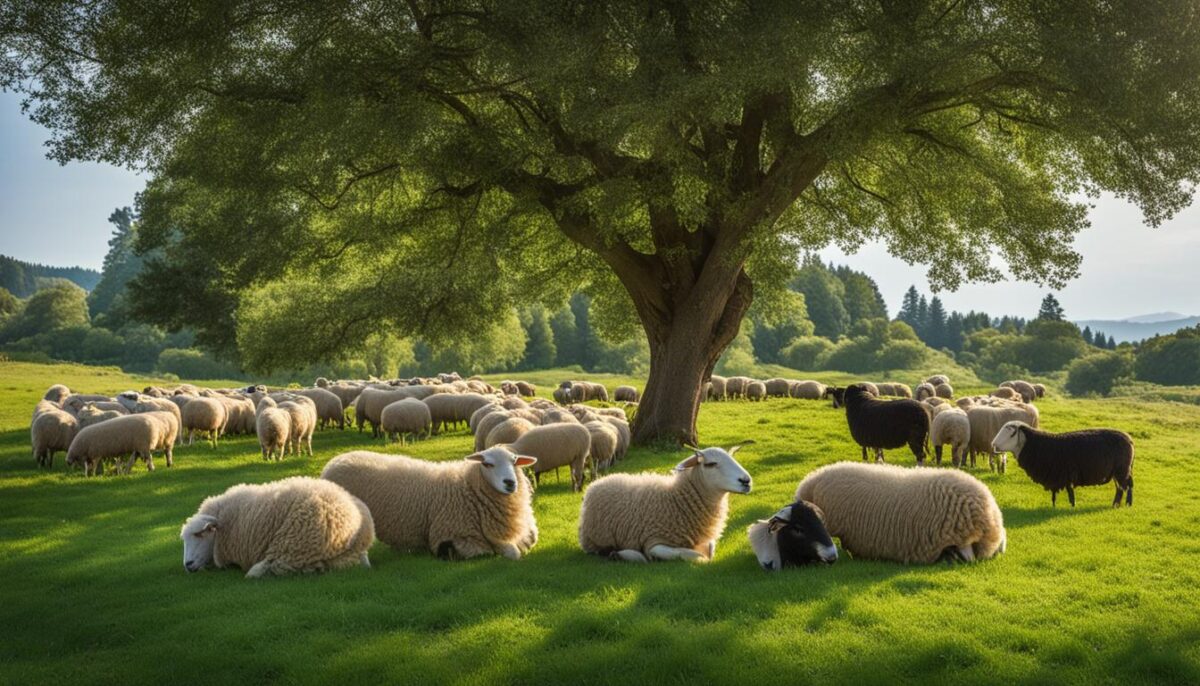
Table: Comparison of Domesticated Sheep and Wild Sheep in their Dependence on Humans
| Aspects | Domesticated Sheep | Wild Sheep |
|---|---|---|
| Dependence on Shearing | Required for comfort and health due to increased wool production | Natural shedding of hair is sufficient |
| Dependence on Flock | Strong flocking instinct, become distressed when separated | Adapted to live in smaller family groups or alone |
| Dependence on Human-Provided Resources | Reliant on humans for access to food and water sources | Adapted to find food and water in the wild |
| Predator Protection | Require human intervention for protection from predators | Evolved natural defenses and instincts for predator avoidance |
Sheep’s Social and Emotional Nature
Sheep are not just simple, unintelligent animals. They possess a complex social and emotional nature that plays a significant role in their survival and well-being. These animals form strong bonds within their flock, relying on the safety of numbers as a defense mechanism against predators. Their ability to recognize the faces and bleats of other sheep is a testament to their social intelligence and memory.
Research has shown that sheep have the capacity to remember human faces for up to two years, indicating their cognitive abilities and ability to form lasting connections. This social and emotional nature makes them reliant on the presence and interactions with other beings, be it other sheep or humans. When isolated or separated from their social groups, sheep can experience emotions like stress and depression, further emphasizing their need for social connections.
Sheep are highly social and emotional animals, forming strong bonds within their flock and relying on the safety of numbers as a defense mechanism against predators.
This social and emotional nature highlights the sheep’s reliance on the presence and interactions with other beings, be it other sheep or humans. It also raises important questions about the autonomous survival of sheep in the absence of humans. Without the companionship and support of their flock or the care and protection provided by humans, sheep may face significant challenges in their survival.
The Importance of Social Connections
The social connections formed within a sheep’s flock provide them with a sense of security and protection. This flocking instinct is deeply ingrained in their behavior and contributes to their survival strategies. By staying together in a group, sheep can better detect and defend against potential threats. Additionally, the presence of other sheep provides them with companionship, reducing stress and promoting overall well-being.
Without the support of their flock or the presence of humans, sheep may struggle to navigate their environment and find necessary resources like food and water. Furthermore, sheep’s lack of natural defenses against predators increases their vulnerability in the absence of human protection. Predators such as wolves or coyotes can easily prey on isolated or stray sheep, causing further risks to their survival.
In conclusion, sheep’s social and emotional nature highlights their reliance on social connections with other beings, be it other sheep or humans. Without these connections, sheep may face challenges in their survival and well-being. Their flocking instinct provides them with a sense of security and protection against predators. However, their lack of natural defenses and their dependence on human care and protection make their autonomous survival in the absence of humans a challenging prospect. Understanding the social and emotional needs of sheep is crucial for their welfare and ethical treatment.
Sheep’s Intelligence and Cognitive Abilities
Contrary to popular belief, sheep are intelligent animals with remarkable cognitive abilities. They possess a keen sense of spatial awareness and have been known to excel in spatial puzzles, showcasing their problem-solving skills. Additionally, sheep have the ability to recognize faces, including those of humans, which demonstrates their cognitive capabilities.
“Sheep are not just these mindless creatures that people often perceive them to be. They have a surprising level of intelligence and can adapt to their environment,” says Dr. Jane Shepherd, a renowned animal behaviorist.
These findings suggest that sheep are capable of independent decision-making and can adapt to their environment to some extent. They have also been observed seeking out specific plants, like willow bark, which contain natural pain-killing compounds, indicating a level of self-reliance.
While sheep may rely on humans for care and protection, they are not solely dependent on human intervention for survival. Their intelligence and cognitive abilities allow them to navigate their environment and make choices that contribute to their overall well-being.
Sheep’s Instinctual Behavior and Vulnerabilities without Humans
Sheep possess instinctual behaviors that contribute to their survival, but these behaviors can also make them vulnerable in the absence of human care. One of their most prominent instincts is their flocking behavior, where sheep prefer to stay together in groups for safety. While this behavior provides protection against predators when humans are present, it can also lead to a significant vulnerability when left without human intervention. In some instances, sheep may follow each other, even towards danger, rather than risk isolation.
Another vulnerability that sheep face without human care is their lack of natural defenses against predators. Domesticated sheep have been selectively bred by humans for desirable traits such as wool production, but this has made them reliant on humans for protection. Unlike their wild counterparts, domesticated sheep may struggle to defend themselves against predators without the presence of humans.
Furthermore, in the absence of human intervention, domesticated sheep may face challenges in finding adequate food, water, and shelter. Sheep rely on humans to provide these essential resources, especially in managed farming systems. Without human care, the survival of domesticated sheep becomes more challenging as they lack the self-reliance exhibited by wild sheep species.
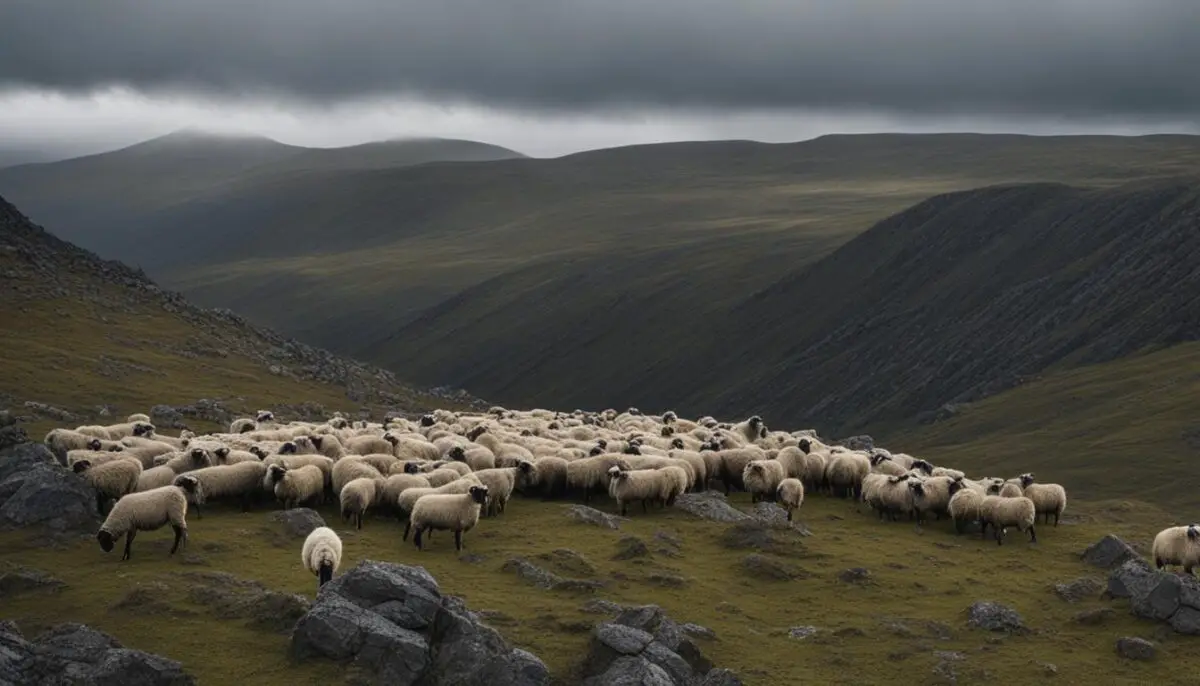
Sheep Vulnerabilities in the Absence of Humans
Table: Sheep’s Vulnerabilities without Human Care
| Vulnerabilities | Description |
|---|---|
| Flocking Behavior | Sheep may follow each other, even towards danger, instead of risking isolation. |
| Lack of Natural Defenses | Domesticated sheep lack the natural defenses of their wild counterparts, making them more vulnerable to predation. |
| Challenge in Finding Resources | Sheep rely on humans for food, water, and shelter, posing a challenge in their survival without human care. |
While sheep have instinctual behaviors that aid in their survival, their vulnerabilities without human care emphasize their dependence on humans for protection and resources. Understanding these vulnerabilities is crucial for ensuring the well-being and survival of domesticated sheep in the absence of human intervention.
Sheep and Human Interaction: A Symbiotic Relationship
From the early days of domestication, sheep and humans have formed a unique and symbiotic relationship. Humans have valued sheep for their wool, meat, and milk, while sheep have relied on humans for protection and care. This interdependence has shaped the behavior, instincts, and survival strategies of both species.
Sheep have a natural flocking instinct, which has made them easy to domesticate and control. Humans have used this instinct to their advantage, employing shepherds to guide and protect sheep. The presence of humans helps keep the flock together, reduces stress and anxiety, and provides a sense of security for the sheep. In return, sheep’s grazing habits have been beneficial for humans, helping to manage vegetation and maintain landscapes.
“The presence of humans helps keep the flock together, reduces stress and anxiety, and provides a sense of security for the sheep.”
The domestication of sheep has allowed humans to influence their genetics and breeding patterns, selecting for desirable traits such as wool quality and meat production. Over time, this has resulted in sheep becoming more reliant on humans for their well-being. Domesticated sheep often require regular shearing, as their wool can become burdensome and cause health issues if left unattended. They also rely on humans for protection from predators and access to food and water sources in managed grazing environments.
While the relationship between sheep and humans has been beneficial in terms of meeting human needs, it is essential to consider the ethical implications and ensure the welfare of the sheep. Providing appropriate care, including access to proper nutrition, healthcare, and social interaction, is crucial for the well-being of these animals. Respecting the natural behaviors and instincts of sheep while meeting their physical and psychological needs is the key to maintaining a harmonious and mutually beneficial relationship between sheep and humans.
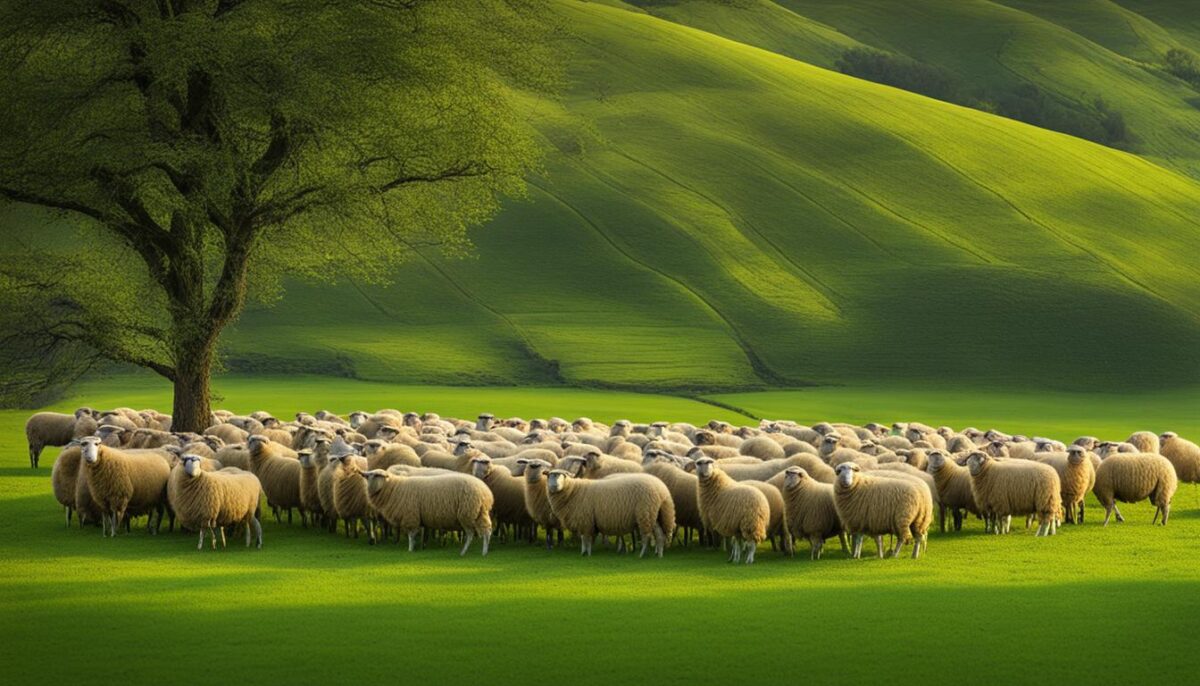
Cruelty in the Wool Industry and its Impact on Sheep
The wool industry exposes sheep to numerous cruel practices, which significantly impact their well-being and welfare. One such practice is mulesing, commonly performed on lambs in countries like Australia. Mulesing involves the removal of skin and flesh from the backsides of lambs without adequate pain relief, leading to immense pain and suffering. This painful procedure is often performed to prevent flystrike, a condition caused by flies laying eggs in the folds of the skin, which can attract maggots and cause severe infections.
Another issue within the wool industry is the long and stressful journeys that unwanted sheep endure on overcrowded cargo ships before reaching their final destinations. These transportation conditions are often cramped and unsanitary, leading to the spread of diseases and high levels of stress among the animals. The combination of confinement, noise, and rough handling can result in physical injuries and extreme distress for the sheep.
“The wool industry exposes sheep to inhumane practices that are deeply concerning. Mulesing and the transportation of sheep on overcrowded ships are not only cruel but also unnecessary. We must prioritize the well-being and ethical treatment of these animals.”
These practices highlight the vulnerable position of sheep within the wool industry and their reliance on human care for their welfare. It is essential to address these issues and advocate for more humane and ethical practices within the industry to ensure the well-being of sheep.
| Issue | Impact on Sheep |
|---|---|
| Mulesing | Causes immense pain and suffering; increases vulnerability to infections |
| Long-distance transportation | Leads to high stress levels, physical injuries, and spread of diseases |
Ethics of Sheep Keeping and Animal Welfare
When it comes to sheep keeping, ensuring ethical practices and promoting animal welfare are of paramount importance. The well-being of these gentle creatures should be a top priority. Proper care, encompassing access to food, water, shelter, and veterinary attention, is essential for their survival and overall health.
Sheep are highly social animals, and their mental well-being is closely tied to their social interactions and flock dynamics. Isolation and stress can have negative impacts on their mental health, leading to anxiety and depression. Therefore, creating an environment that fosters socialization and maintains flock cohesion is crucial for their welfare.
Respecting the individuality and emotional capacity of sheep is vital. These sentient beings have their unique personalities and should be treated with kindness and compassion. Upholding high standards of animal welfare means recognizing and fulfilling their physical, emotional, and psychological needs.
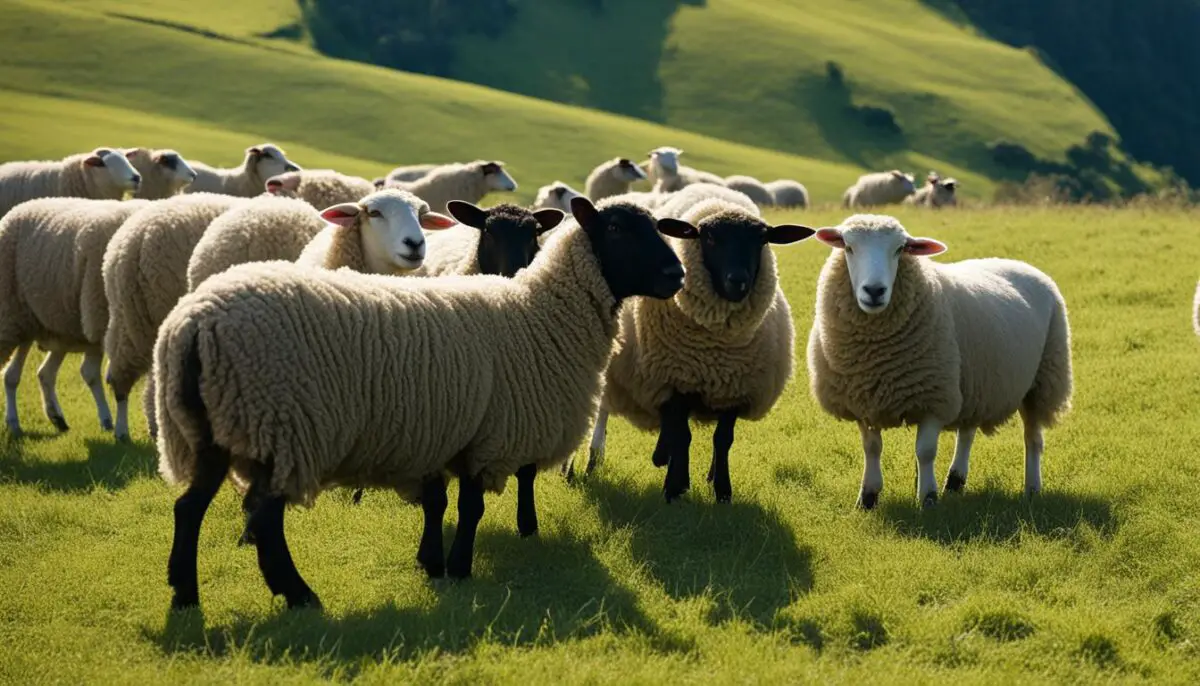
By adopting ethical practices and prioritizing animal welfare, we can ensure that sheep are able to live fulfilling lives. It is our responsibility to provide them with the care and respect they deserve, acknowledging their inherent value as living beings. Together, we can create a world where sheep are treated with kindness and compassion, where their well-being is a fundamental consideration in all aspects of sheep keeping.
Conclusion
In conclusion, the survival of sheep without humans can be challenging. While wild sheep species have adapted to thrive in the absence of human intervention, domesticated sheep have become dependent on human care and protection. Sheep’s natural adaptations, such as their coats and horns, allow them to withstand harsh climates and navigate challenging terrains. However, threats like predation, habitat destruction, and hunting pose significant risks to their survival.
Sheep’s social and emotional nature further highlights their reliance on the presence and interaction with other beings, whether it be other sheep or humans. Their intelligence and cognitive abilities enable them to make independent decisions and adapt to their environment to some extent. However, their instinctual behaviors, such as flocking, can also make them vulnerable without human guidance.
It is crucial to recognize the symbiotic relationship between sheep and humans and the ethical considerations of their care. Practices in the wool industry, such as mulesing and long-distance transportation, shed light on the vulnerabilities of sheep and the impact of human interventions. Respecting the individuality and emotional capacities of sheep is vital for their welfare and the ethical treatment of these animals. Understanding and meeting their physical and psychological needs are essential for their survival and overall well-being.
FAQ
Can sheep survive without humans?
Sheep can survive in the wild without direct human intervention. However, domesticated sheep have become reliant on human care and protection.
What natural adaptations do sheep have for survival?
Sheep have coats of hair and wool to keep them warm, as well as large curling horns for protection. They are herbivores and can survive on plants, grass, and seeds.
Are domesticated sheep dependent on humans for survival?
Yes, domesticated sheep have been selectively bred by humans for desirable traits and have become reliant on humans for their care and well-being.
How do sheep’s social and emotional nature affect their survival?
Sheep form strong bonds within their flock and rely on the safety of numbers as a defense mechanism. They can experience stress and depression when isolated or separated from their social groups.
Do sheep possess cognitive abilities?
Yes, sheep have been found to have excellent spatial awareness, can recognize faces (including those of humans), and can make independent decisions based on their environment.
What are the vulnerabilities of sheep without human care?
Sheep may follow each other even toward danger instead of risking isolation. They lack natural defenses against predators and can struggle to find adequate food, water, and shelter without human intervention.
What is the relationship between sheep and humans?
Sheep have been domesticated for thousands of years and have a symbiotic relationship with humans, who have found them easy to domesticate due to their flocking instincts and herding behavior.
What are the cruel practices in the wool industry?
Sheep in the wool industry can be subjected to painful procedures like mulesing without adequate pain relief. Additionally, millions of unwanted sheep endure long and stressful journeys before being slaughtered.
How should sheep be ethically kept for their welfare?
Proper care, including access to food, water, shelter, and veterinary attention, is crucial for sheep’s well-being. Respecting their social nature and valuing their individuality is also important.
What is the conclusion regarding sheep survival?
While wild sheep can thrive without human intervention, domesticated sheep have become dependent on humans for their care and protection.


